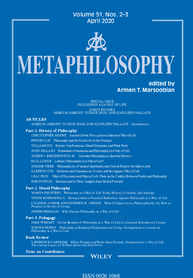|
Over the last few months I have signed three new contracts for books, all of which are collaborations with others. They are (in the most likely order of completion):
1. Barlaam of Seminara on Stoic Ethics (Mohr Siebeck), with C. R. Hogg, comprising a text and translation of Barlaam’s work on Stoic ethics, along with a series of interpretative essays. 2. The Cambridge Companion to Marcus Aurelius’ Meditations (Cambridge University Press), with a chapter by myself and 10 other contributors. 3. Brill’s Companion to Musonius Rufus (Brill), co-edited with Liz Gloyn, my colleague at Royal Holloway, and many, many contributors.  I’ve just had an article published, entitled ‘Renaissance Humanism and Philosophy as a Way of Life’. This has been kicking around for a while; its first outing was at a conference in Italy in 2015, and I read it more recently at a conference in London I co-organized in 2019. It has been published in a special issue of Metaphilosophy devoted to the theme of philosophy as a way of life. Due to an existing agreement between Royal Holloway and Wiley, it has been published open access. It’s part of a larger project I’ve been working on over the last few years on this topic. I have recently sent off two other papers that complement it, both of which will appear as chapters in edited volumes. The first looks at the Renaissance interest in biographies of ancient philosophers and what that might tell us about how they conceived philosophy in the period (‘Philosophical Lives in the Renaissance’). The second looks at works of philosophical consolation in the Renaissance and again what that might tell us about how they understood philosophy (‘Renaissance Consolations: Philosophical Remedies for Fate and Fortune’). I’ve had tentative plans to try to develop a book on this topic, building on these three preliminary papers. A much earlier paper on spiritual exercises in Justus Lipsius could also feed into it (here). I have not fully decided either way, but even so these three new pieces together try to make the case for the claim that during the Renaissance a number of thinkers embraced the idea of philosophy as a way of life, and by acknowledging this we can make better sense of what they were doing. |
 RSS Feed
RSS Feed
